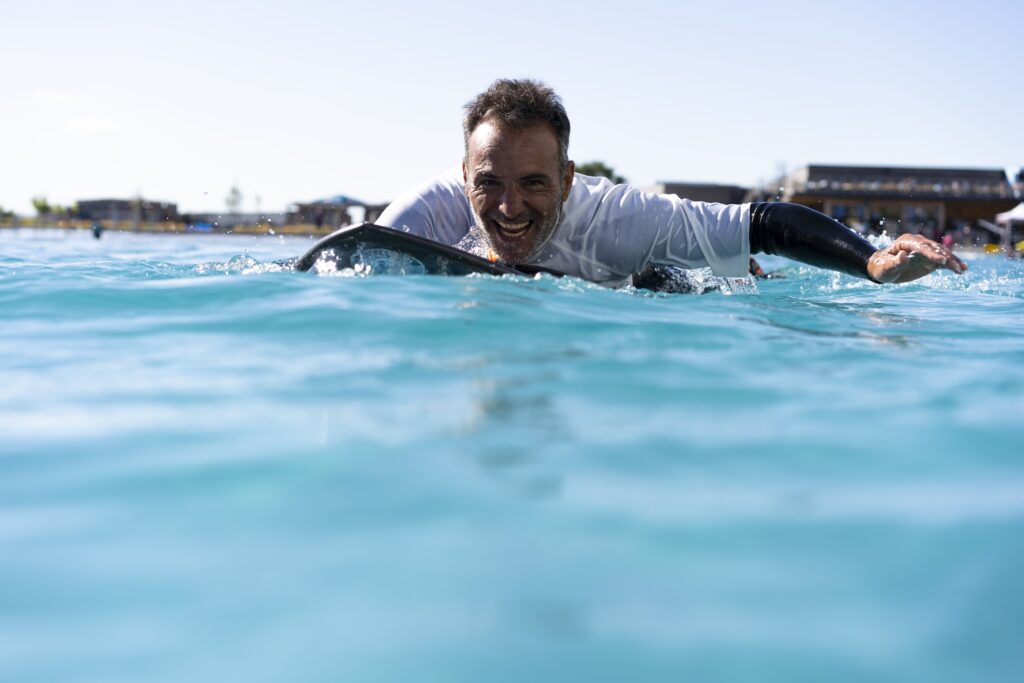We have worked with the University of Bristol to carry out the biggest surfer survey in 10 years – and the UK Surfing and Health Report is released today, on International Surfing Day 2024.
It found that better mental wellbeing, fun and improved performance, are the biggest motivations for surfing – and importantly also shows a positive relationship between increased frequency of surfing and better mental wellbeing. Investigating this further will be the focus of a University of Bristol 4-year PhD that will start this autumn.
We have always been big supporters of academic research, particularly in the areas of blue health and surf therapy, which is why we have worked closely with the University of Bristol – and others – since we opened. We are delighted that we will now be able to support a PhD that will further understanding of how and why surfing impacts mental wellbeing.
The UK Surfing and Health Report examines a number of areas related to surfing behaviours in the UK, including motivations and barriers to surfing, surf-related spending and how surfing relates to people’s feelings, physical health and mental wellbeing. Almost 1,350 people took part in the research survey.

Key findings from the Surfing and Health Survey report include:
-
1,344 people took part in the UK Surfing and Health Survey
-
On average, respondents reported surfing almost 4 times each month, with August, September and October being the most popular
-
The average surfer spends an estimated £2,101.08 each year on surfing activities, with most being spent on fuel/transport, accommodation, and board purchases
-
Most people (93-96.2%) make their surf-related purchases within the UK, either locally, regionally or nationwide
-
The top 3 barriers for surfing were weather, work/study commitments or travel time. Other barriers included pollution, lack of suitable transport, and cost
-
The top three motivations were to have fun, improve performance, and to improve mental wellbeing. Other motivations included being in nature, spending time with others and being able to “escape”
-
The top 3 facilitators for future surfing were closer facilities, reduced cost to access and people to surf with. People also mentioned improved transport links and better/cleaner surfing conditions

The report concludes that findings show a relationship between surfing frequency and positive physical health and mental wellbeing – and calls for more research to understand the strength and impact of this. It also found that surfing significantly contributes to the UK economy, with the average surfer spending over £2,000 per year and over 90% of surf-related purchases made within the UK.
Student Ariane Gerami has secured funding for a 4-year PhD, supported by The Wave, to further research the link between surfing and mental health. Ariane carried out a Masters’ thesis, supported by The Wave, in 2022 that found that surfing can support better mental health. The research was published in the International Journal of Environmental Research and Public Health and her PhD will build on these findings. She will work with The Wave to capture data from a wide range of different demographic groups to explore how and why surfing impacts mental wellbeing.

Nick Hounsfield, Founder of The Wave
“The power of water and waves to make us feel better is at the heart of why The Wave exists. It is so important to us to support and further academic research in to surfing and health – particularly mental health. This report, and crucially the PhD commencing this autumn, will add to the growing body of research in the area of ‘blue health’ – evidence that being in or near water has huge health benefits.”
Hazel Geary, CEO at The Wave
“Every day we witness the positive impact that surfing has on our visitors. The beaming smiles after time spent in the lake say it all! It is incredibly exciting that we can now work with the University of Bristol to further explore and understand the relationship between surfing and mental wellbeing.”
